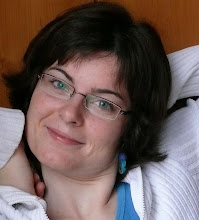We were pretty lucky, because our school started at 12.30 on Wednesday - therefore we could sleep enough after Kafka café. We had a very interesting lesson with Torbjorn. At first he explained us the old and new
Danish evaluation systems. I was really surprised - it´s completely different from ours!Why?
I will explain
the old one first:
There were grades (from the bottom): 0,3,5,6,7,8,9,10,11 and 13.
0,3 and 5 meant that the pupil
hadn´t passed.
8 was
the average that teachers could expect.
And grades 11 and 13 were
special grades - to appreciate really good students. 13 meant very excellent, above expectations, the very special grade.
I think it was very nice to be able to give an extraordinary grade to an extraordinary pupil - to appreciate him. Unfortunately, this grade disappeared. The Danish system was changed - we were told that the old system was to confusing to the rest of Europe.
And
the new system?
There are grades (from the top) :
12 -expectations
10
7
4
2
------------ passed
and 0
- 3 (which is rather exceptional - for example for students who were cheating during the final written exam and failed the oral exam)
Torbjorn said us that he thinks the new system was a step BACKWARD. The previous could appreciate extraordinary students, however the new one measures, how much you don´t fullfil the expectations (from 12 DOWN). I could agree with him, I found the previous system very interesting.
One more note considering evaluation.
This system is from LOWER SECONDARY schools.
At PRIMARY SCHOOLS pupils get "only" written sentences to parents (to avoid too much competition amongst kids).
Then we had a lecture about
Learning theories - e.g. three types of curricula:
A) content driven
B) objective driven
and C) process driven
It was very interesting to GO MORE BEHIND the differences at school systems and school approaches. Since it´s nice to observe differences of my country and Danish school system, but then it´s very useful to think -WHY? And this lecture helped me to start thinking about "what I intend to expect from my future pupils. And why? What is more important for me - the content, abilities of pupils or the process of learning itself...?"
All the subects and projects of "Living and Learning Together - not only about school systems, but also cultures - makes me thinking more deeply, to go more behind, to ask questions...not only observe and compare. And that is what I really like about this study programme. On Thursday we had pretty exciting lesson of
History. I had never thought before that history could be interesting. However, it can! Jorn Buch persuaded me :-)! I thought we were going to have a boring lesson about Danish history - dates, people, events...How wrong I was!

Jorn involved all our own countries´ histories - and helped us to see that almost all European countries had very similar history. Christianity, Reformation, Romanticism, Nationalism... Do you see? He surprised us, because he had pretty good knowledge about our countries´history, dates (even better that we had!) - and showed us a plenty of connections.
Astonishing! :-)
And I have to appreciate that eventhough he had had an accident during tennis-playing and has his arm hurt the evening before, he came - because he really wanted to teach us. Thank you very much!
We had also Danish lesson on Thursday - trying to develop our Danish language skills in basic conversations. I learnt a very useful sentence: "Jeg taler ikke godt dansk".
(For understanding use: http://translate.google.com :-) )
On Friday we had a lesson with Torbjorn about
Globalisation. Globalisation and its pros and (mostly) cons has been a pretty discussed topic recently - however almost nobody has been able to explain well WHAT globalisation really is. Therefore I was very glad that we started to think and discuss globalisation from different sides. What is it connected with, what does it cause, mean and what are its both possitive and negative effects...we took it very complexely (or "globally", if you want to :-) ).
The interesting and surprising idea for me was - that this is not the first globalisation in history. Because there was one before - throughout "Christianisation" (- spreading christianity, latin language and ideas).
And then we started to speak about different parts of globalisation
- sociology and antropology
- international politics and economy
- citizenship and democracy
- trade
- and pedagogy
I am really looking forwart to continuation of this lesson...
 First of all we played some “icebreaking” games as a “Shark” – Flemming explained us that it is much easier for some pupils to “break the barriers, to get over shyness” while they are having some role. Because if you are “shark”, you think for the shark and much less how you are looking etc…
First of all we played some “icebreaking” games as a “Shark” – Flemming explained us that it is much easier for some pupils to “break the barriers, to get over shyness” while they are having some role. Because if you are “shark”, you think for the shark and much less how you are looking etc… 





















